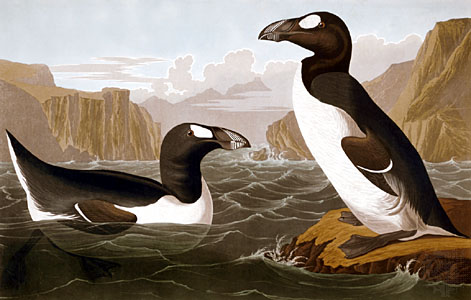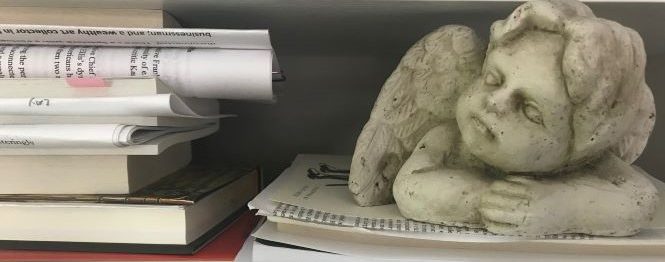 More than 150 years ago, the flightless Great Auk of the North Atlantic disappeared, doomed to extinction by its gentle nature that made it easily accessible to hunters. When its numbers perilously decreased, museums increased their desire to stuff the unusual bird for their showcases. In Jeremy Page’s enthralling new novel set in 1845, narrator Eliot Saxby, the eponymous collector, says, “I suppose each museum and private collector felt it might be the last opportunity to own one of these birds, or one of their eggs.”
More than 150 years ago, the flightless Great Auk of the North Atlantic disappeared, doomed to extinction by its gentle nature that made it easily accessible to hunters. When its numbers perilously decreased, museums increased their desire to stuff the unusual bird for their showcases. In Jeremy Page’s enthralling new novel set in 1845, narrator Eliot Saxby, the eponymous collector, says, “I suppose each museum and private collector felt it might be the last opportunity to own one of these birds, or one of their eggs.”
Eliot, a serious, thoughtful naturalist, recounts the time he traveled to an uninhabited island off the coast of Iceland where the last Great Auks were believed to have been seen. His passage on the Amethyst, a trade ship that makes a living by plundering the Arctic region, has been paid for by Englishmen who made a bet about whether or not the bird still exists.
It’s not long before Eliot finds himself in an unnerving situation. The ship is commandeered by a sociopath, Captain Sykes, who embroiders in his spare time, and the reserved, unpredictable first mate, Quinlan French. Also, Eliot shares his passenger status with a flamboyant gentleman hunter named Edward Bletchley and his fragile, beautiful cousin Clara. Eliot is certain Clara is Celeste, a woman he knew and loved 10 years ago, when she was 16 and he was 22, but Clara does not recognize him.
“It occurred to me, in a fleeting moment of total understanding,” Eliot says, “that I was on a journey of several mysteries, some surrounding me and within reach, but others as dark and impenetrable as the ocean beyond the ship.”
I read The Collector of Lost Things deeply engaged in the beautiful writing and exceptional, limited world of a ship where contentious relationships explode and the nautical routines of the three-masted vessel come to life. Page writes poetically and realistically, successfully capturing what it must feel like to know vulnerability in the face of the ice-enclosed sea, empty sky and freezing temperatures.
The aggressive slaughter of Arctic animals, however, came as a shock and proved difficult to read, as Eliot witnesses the Amethyst crew take out walruses, whales and seals for trade and profit. Even so, the cruelty fits the context of the 19th century, when such hunting practices were accepted — the blubber was used for lamp oil; feathers for pillows and ornamentation. The story is not without environmental conscience — Bletchley initially engages joyfully in the shooting of Arctic birds, but then he’s faced with killing a seal that looks at him with its steady, onyx-like, soft eyes. The connection tumbles the opium addicted poseur into unrelenting torment. He feels in his soul the murder of innocent creatures being committed and does not recover.

When the Amethyst arrives at its destination off the coast of Iceland, Eliot experiences tragedy and hope for the Great Auk. So as not to give away the story, I’ll simply say the experience results in an on-board conspiracy between Eliot, Clara and Quinlan. Their secret creates tension, as does the haunting mystery of Eliot and Clara’s past. Both conspiracy and romance drive toward a conclusion one could predict; however, under Page’s talented pen, the story wraps us seductively in the provocative setting, Victorian-era morals and clashing ethics until the end. The Collector of Lost Things is a fascinating, distinctive novel about the past that can haunt us and “mankind’s failure to be anything other than a beast of greed and profit.”
Page writes with authority, knowledge and elegance about the North Atlantic and Arctic oceans. His previous, critically acclaimed novel, Sea Change, takes place in the North Sea.
According to National Geographic Reference Atlas to the Birds of North America, the Great Auk (Penguinus impennis) was the original penguin, after which the penguins of the Southern Hemisphere were named.

Thank you for another year of fascinating reviews — more precisely, your reviews have been insightful and the subject matter has been fascinating! Have the happiest — reading-est — New Year!
Laralyn
P.S. Nice “snowfall” on the page!
LikeLike
Thank you. And back atcha for the happiest, reading-est 2014!
LikeLike